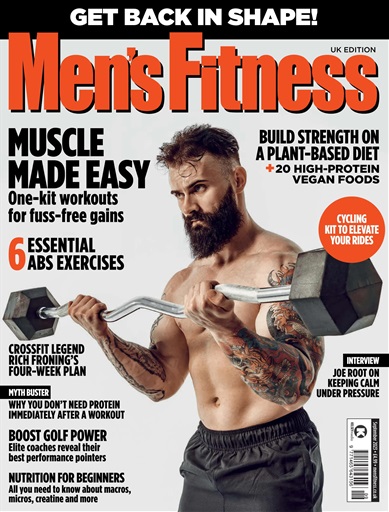The Strongman Diet focuses on high-protein foods to support muscle growth and strength. This article explores the key principles of the Strongman Diet and how it can benefit athletes and strength enthusiasts.
The diet emphasizes consuming lean meats, including poultry, beef, and seafood, to provide the body with essential nutrients. Additionally, it promotes incorporating a variety of fruits and vegetables to ensure a well-rounded intake of vitamins and minerals. The Strongman Diet also encourages consuming complex carbohydrates, such as whole grains and starchy vegetables, to fuel intense workouts and aid in recovery.
By following the Strongman Diet, athletes can optimize their training performance and achieve their strength goals.
The Importance Of Nutrition In Strongman Training
Nutrition plays a vital role in maximizing performance and strength for strongman training. A well-balanced strongman diet is essential for muscle growth, energy levels, and recovery, ensuring athletes can push their limits and achieve their goals.
Nutrition plays a crucial role in maximizing performance and strength gains for strongman athletes. Proper fueling not only provides the energy needed to perform at high intensity but also supports muscle growth, recovery, and overall health. Understanding the key macronutrients and micronutrients necessary for strongman training is vital for success in this demanding sport.
Key Macronutrients For Strongman Athletes:
- Carbohydrates: These are the primary source of energy for intense workouts and should make up a significant portion of a strongman athlete’s diet. Complex carbohydrates like whole grains, fruits, and vegetables provide sustained energy and support glycogen stores in muscles.
- Proteins: Essential for muscle repair and growth, proteins should be consumed in adequate amounts to support the demands of strongman training. Lean meats, poultry, fish, eggs, dairy products, legumes, and plant-based protein sources like tofu and tempeh are excellent choices.
- Fats: While often overlooked, healthy fats are an integral part of a strongman athlete’s diet. They provide energy, support hormone production, and help with nutrient absorption. Good sources of healthy fats include avocados, nuts, seeds, olive oil, and fatty fish.
Key Micronutrients For Strongman Athletes:
- Iron: Adequate iron intake is crucial for oxygen transport in the body and preventing fatigue. Iron-rich foods include lean red meat, poultry, seafood, legumes, spinach, and fortified cereals.
- Calcium: Strong bones are essential for lifting heavy weights, and calcium plays a vital role in bone health. Dairy products, fortified plant-based milk alternatives, leafy greens, and calcium-fortified foods are excellent sources of calcium.
- Vitamin D: This vitamin is essential for proper calcium absorption and muscle function. Sunlight exposure, fatty fish, fortified dairy products, and supplements can help maintain adequate vitamin D levels.
- B-vitamins: B-vitamins, including B6, B12, and folate, are essential for energy metabolism and red blood cell production. Foods such as lean meats, fish, eggs, whole grains, legumes, and leafy green vegetables are rich in B-vitamins.
- Antioxidants: Strongman training places stress on the body, leading to an increase in free radicals. Antioxidants like vitamins C and E, found in fruits and vegetables, help neutralize these radicals and support recovery and overall health.
Understanding the importance of these key macronutrients and micronutrients in strongman training will allow athletes to optimize their nutrition and fuel their performance effectively. By ensuring a well-balanced diet that meets the specific needs of strongman training, athletes can enhance their strength gains and achieve peak performance levels.
Creating A Strongman Meal Plan
Create a powerful meal plan to fuel your strongman workouts and enhance performance. Optimize your strongman diet with a well-balanced combination of proteins, complex carbs, and healthy fats for maximum strength gains and muscle recovery.
Planning your meals as a strongman athlete is crucial for achieving optimal performance and muscle growth. A well-structured meal plan ensures that you are consuming the right amount of calories, macronutrients (macros), and timing your meals for fueling workouts and aiding recovery.
Let’s explore the key aspects of creating a strongman meal plan.
How To Calculate Your Caloric Needs Based On Body Weight And Activity Level:
- Determine your basal metabolic rate (BMR), which represents the calories needed to sustain basic bodily functions at rest.
- Use the Harris-Benedict equation: BMR = (10 × body weight in kg) + (6.25 × height in cm) – (5 × age in years) + 5 (for men) or -161 (for women).
- Factor in your activity level.
- Sedentary lifestyle (little to no exercise) = BMR × 1.2
- Lightly active (light exercise/sports 1-3 days/week) = BMR × 1.375
- Moderately active (moderate exercise/sports 3-5 days/week) = BMR × 1.55
- Very active (hard exercise/sports 6-7 days a week) = BMR × 1.725
- Extremely active (very hard exercise/sports & physical job, or 2x training) = BMR × 1.9
- Adjust your caloric intake based on your specific goals (e.g., muscle gain, weight loss, maintenance).
Balancing Macros For Optimal Energy And Muscle Growth:
- Protein: Consume 0.8-1 gram of protein per pound of body weight to support muscle growth and repair.
- Carbohydrates: Ensure an adequate intake of complex carbohydrates (whole grains, fruits, vegetables) for sustained energy during workouts and recovery.
- Fats: Incorporate healthy fats (avocado, nuts, olive oil) into your diet to support hormone production and overall health.
- Aim for a balanced distribution of macros: Around 40% of calories from carbohydrates, 30% from protein, and 30% from fats. Adjust these ratios based on personal preference and performance.
Meal Timing And Frequency For Fueling Workouts And Recovery:
- Pre-workout nutrition: Consume a meal or snack containing easily digestible carbohydrates and a moderate amount of protein about 1-2 hours before training to provide energy for intense workouts.
- Intra-workout nutrition: Consider consuming a carbohydrate-rich drink or snack to maintain energy levels during long training sessions or competitions.
- Post-workout nutrition: Consume a meal within 1-2 hours after training to replenish glycogen stores and facilitate muscle recovery. This meal should include a good source of protein and carbohydrates.
- Meal frequency: Aim for 4-6 smaller meals/snacks throughout the day to maintain a steady supply of nutrients and support muscle growth. Listen to your body’s hunger and fullness cues to determine your ideal meal frequency.
By calculating your caloric needs, balancing macros, and implementing strategic meal timing, you can create a strongman meal plan that optimizes your energy levels, supports muscle growth, and aids in recovery. Remember to consult with a nutritionist or dietitian to tailor the plan to your specific needs and goals.
Stay dedicated and consistent in your dietary approach to fuel your strongman journey to success.
Power Foods For Strongman Athletes
Fuel your strongman training with a powerful diet of nutrient-rich power foods to maximize performance and strength gains. Incorporate lean proteins, complex carbohydrates, and healthy fats to optimize your body’s energy levels and recovery. Stay consistent with a balanced strongman diet to excel in your athletic pursuits.
Fueling the immense strength and power required for strongman competitions is no easy feat. Proper nutrition plays a crucial role in supporting muscle repair, sustaining energy levels, and optimizing overall performance. Here are some power-packed foods that every strongman athlete should include in their diet:
Protein-Rich Foods For Muscle Repair And Growth:
- Lean meats (chicken, turkey, beef): Packed with essential amino acids, these meats help build and repair muscles.
- Fish (salmon, tuna, sardines): Rich in omega-3 fatty acids, fish aids in reducing inflammation and supports muscle recovery.
- Eggs: A complete protein source, eggs provide vital nutrients like choline and vitamin D, promoting muscle growth and repair.
- Greek yogurt: High in protein and probiotics, yogurt aids in muscle recovery and digestion.
- Cottage cheese: With a slow-release protein profile, cottage cheese contributes to sustained muscle repair and growth.
Carb Sources For Sustained Energy And Glycogen Replenishment:
- Sweet potatoes: Packed with complex carbohydrates, sweet potatoes offer long-lasting energy and promote glycogen replenishment.
- Brown rice: A staple for many athletes, brown rice provides slow-digesting carbs that sustain energy levels during intense training.
- Quinoa: A complete protein source, quinoa also contains complex carbs to fuel workouts and aid in muscle recovery.
- Oats: High in fiber and low glycemic, oats provide a steady release of carbohydrates to energize the body.
Healthy Fats To Support Hormone Production And Joint Health:
- Avocado: Rich in monounsaturated fats, avocados support hormone production and aid in joint health.
- Nuts and seeds (almonds, walnuts, chia seeds): Packed with omega-3 fatty acids, these foods reduce inflammation and support joint health.
- Extra virgin olive oil: High in monounsaturated fats and antioxidants, olive oil promotes healthy hormone balance and reduces inflammation.
Essential Vitamins And Minerals For Overall Health And Performance:
- Dark leafy greens (spinach, kale): Loaded with vitamins A, C, and K, dark leafy greens support immune function and reduce exercise-induced inflammation.
- Berries (blueberries, strawberries): Bursting with antioxidants, berries aid in post-workout recovery and promote overall health.
- Colorful fruits and vegetables: The vibrant colors of a variety of fruits and vegetables indicate different nutrient profiles, ensuring a wide range of essential vitamins and minerals.
By incorporating these power foods into their diet, strongman athletes can fuel their bodies with the nutrients necessary to enhance muscle repair, sustain energy levels, support hormone production, and promote overall health and performance. Remember, maintaining a well-rounded diet composed of protein, carbs, healthy fats, vitamins, and minerals is key to achieving peak strength and power in the world of strongman competitions.
Pre-Workout Nutrition For Maximum Strength
For maximum strength in strongmen, a well-balanced pre-workout nutrition plan is essential. By providing the right fuel to the body, strongmen can optimize their performance and achieve their goals with maximum efficiency.
Tips For Fueling Your Body Before A Strongman Training Session Or Competition
Preparing your body for a strongman training session or competition requires attention to pre-workout nutrition. By fueling your body with the right foods and nutrients, you can maximize your strength and performance. Here are some tips to help you optimize your energy levels:
- Consume complex carbohydrates: Prioritize foods such as whole grains, sweet potatoes, and brown rice. These carbohydrates provide a sustained release of energy, keeping you fueled throughout your training session.
- Include lean protein sources: Protein is essential for muscle repair and growth. Incorporate sources like chicken breast, lean beef, and fish into your pre-workout meals.
- Hydrate adequately: Drinking enough water is crucial for optimal performance. Aim to consume at least 16 ounces of water 2 hours before your training session, and an additional 8-16 ounces 15-30 minutes before starting.
- Don’t forget healthy fats: Healthy fats, such as avocados, nuts, and olive oil, provide essential fatty acids that support hormone production and overall health. Include a small serving of these fats in your pre-workout meals.
- Avoid heavy meals: Large, heavy meals can lead to discomfort during training. Instead, opt for smaller, easily digestible meals or snacks that provide sustained energy without weighing you down.
Meal And Snack Ideas To Optimize Energy Levels And Enhance Performance
Here are some meal and snack ideas that can help you optimize your energy levels and enhance your performance before a strongman training session or competition:
- Greek yogurt with berries and a sprinkle of granola: This combination provides a mix of protein, carbohydrates, and antioxidants to fuel your workout.
- Grilled chicken breast with quinoa and steamed vegetables: This balanced meal offers a healthy dose of lean protein, complex carbohydrates, and essential nutrients.
- Peanut butter and banana sandwich on whole-grain bread: The combination of protein, healthy fats, and carbohydrates in this classic snack provides long-lasting energy.
- Oatmeal topped with sliced almonds and a drizzle of honey: High in complex carbohydrates and fiber, oatmeal is a great choice for sustained energy. Almonds add protein and healthy fats.
- Protein smoothie made with a blend of fruits, spinach, Greek yogurt, and almond milk: This refreshing drink is packed with nutrients, including protein, vitamins, and minerals.
Remember, everyone’s nutritional needs are unique, so it’s essential to find what works best for you. Experiment with different combinations and listen to your body to determine which pre-workout meals or snacks optimize your energy levels and enhance your performance best.
Post-Workout Recovery And Nutrition Strategies
Looking to optimize your strongman diet for post-workout recovery and nutrition strategies? Discover effective ways to replenish your body for optimal performance and muscle growth.
The Importance Of Post-Workout Nutrition For Muscle Recovery And Growth
Proper nutrition plays a crucial role in maximizing your muscle recovery and growth after a grueling strongman workout. Your body needs essential nutrients to repair damaged tissues, replenish energy stores, and promote muscle protein synthesis. Here are some key points to consider:
- Protein: Consuming an adequate amount of protein post-workout is vital for muscle repair and growth. Aim for around 20-30 grams of high-quality protein, such as lean meats, poultry, fish, eggs, or dairy products.
- Carbohydrates: Replenishing your glycogen stores is essential to restore energy levels and support optimal muscle recovery. Consume complex carbohydrates like whole grains, fruits, and vegetables to provide a steady release of energy.
- Fats: While fats may not have a direct impact on post-workout recovery, they play a crucial role in overall health and hormone production. Include moderate amounts of healthy fats from sources like avocados, nuts, seeds, and olive oil.
- Micronutrients: Don’t overlook the importance of vitamins and minerals in your post-workout nutrition. These micronutrients support various physiological processes necessary for recovery and growth. Incorporate a variety of colorful fruits and vegetables to obtain a wide range of vitamins and minerals.
- Timing: Consuming a well-balanced meal or snack containing protein and carbohydrates within 30 minutes to an hour after your workout can optimize recovery. This window of time is when your body is most receptive to nutrient absorption and utilization.
Nutrient Timing And Composition For Effective Recovery
Timing your nutrient intake around your workouts can have a significant impact on your recovery and performance. Here’s what you need to know:
- Pre-workout: Fuel your body with a balanced meal or snack containing carbohydrates and protein about 1-2 hours before your workout. This ensures that your muscles have enough energy to perform at their best.
- During workout: If your workouts are prolonged or intense, you may benefit from consuming a carbohydrate-rich sports drink or a small snack to replenish glycogen stores and maintain energy levels.
- Post-workout: As mentioned earlier, consuming a meal or snack containing protein and carbohydrates within the post-workout window is crucial. This helps jumpstart the recovery process, replenish glycogen stores, and promote muscle repair and growth.
Hydration Guidelines To Replenish Fluids And Electrolytes
Proper hydration is often overlooked but is paramount for recovery and performance. Follow these guidelines to ensure you’re staying hydrated:
- Water: Drink water throughout the day to maintain hydration levels. A good general guideline is to aim for at least 8 cups (64 ounces) of water per day. Increase your intake if you’re engaging in intense physical activity or in hotter environments.
- Electrolytes: Sweating during workouts leads to the loss of electrolytes, which are essential for muscle function. Include electrolyte-rich foods such as bananas, citrus fruits, leafy greens, and coconut water in your post-workout meals or snacks.
- Sodium: Replenishing sodium levels after a tough workout is crucial, especially if you sweat heavily. Adding a pinch of salt to your post-workout meal can help restore sodium levels and aid in rehydration.
By understanding the importance of post-workout nutrition, focusing on nutrient timing and composition, and prioritizing proper hydration, you can optimize your recovery and fuel your strongman journey. Remember, consistency with your diet and listening to your body’s signals are key to achieving your performance goals.

Credit: www.amazon.com
Supplements For Strongman Athletes
Supplements play a crucial role in the Strongman diet, aiding athletes in their pursuit of strength and power. These specialized supplements provide essential nutrients that support muscle growth, enhance performance, and optimize recovery for Strongman athletes.
Key Supplements To Consider For Supporting Strength, Performance, And Recovery:
Proper nutrition plays a crucial role in fueling the performance and recovery of strongman athletes. While a well-balanced diet should always come first, supplements can be a valuable addition to help meet specific nutritional needs. Here are some key supplements that strongman athletes may consider incorporating into their diet:
- Protein powders: Protein is essential for muscle growth and repair. Strongman athletes often have higher protein requirements due to the intense nature of their training. Protein powders, such as whey, casein, or plant-based options like pea or hemp protein, can be convenient sources of high-quality protein to support muscle recovery and development.
- Creatine: Creatine is a popular supplement for athletes looking to enhance strength, power, and performance. It provides cellular energy during high-intensity, short-duration activities, making it particularly beneficial for strongman training, which often involves explosive movements and heavy lifting.
- Omega-3 fatty acids: Omega-3 fatty acids, commonly found in fish oil supplements, offer numerous health benefits. They have anti-inflammatory properties that can help reduce exercise-induced muscle soreness and support joint health. Omega-3s also have positive effects on cardiovascular health, important for athletes engaging in intense physical activities.
- Vitamin D: Vitamin D deficiency has been associated with muscle weakness and impaired athletic performance. Strongman athletes, especially those training in indoor environments, may have limited exposure to sunlight, reducing their natural vitamin D synthesis. Supplementing with vitamin D can help maintain optimal levels to support muscle function, bone health, and overall performance.
- Branched-chain amino acids (BCAAs): BCAAs consist of three essential amino acids – leucine, isoleucine, and valine. They play a crucial role in muscle protein synthesis, aiding in muscle recovery and reducing muscle damage. Supplementing with BCAAs before, during, or after intense training sessions can help support muscle growth, reduce muscle soreness, and enhance endurance.
- Beta-alanine: Beta-alanine is an amino acid that enhances muscle endurance by increasing intramuscular carnosine levels. Carnosine acts as a buffer against the buildup of lactic acid, which can contribute to fatigue during high-intensity exercise. By delaying muscle fatigue, beta-alanine supplementation may improve performance in strength-based activities like strongman training.
- Glutamine: Glutamine is an abundant amino acid in the body that plays a crucial role in protein synthesis, immune function, and gut health. During intense training, glutamine levels may become depleted, which can compromise muscle recovery and immune function. Supplementing with glutamine can help support muscle repair, reduce exercise-induced inflammation, and promote overall recovery.
- Caffeine: Caffeine is a widely used ergogenic aid that can enhance performance and reduce fatigue. It stimulates the central nervous system, increasing alertness and focus during training sessions. Some studies suggest that caffeine supplementation can improve strength, power, and endurance, making it a potential supplement of interest for strongman athletes.
It’s important to remember that supplements should complement, not replace, a well-balanced diet. Consultation with a qualified healthcare professional or sports nutritionist is recommended to determine individual needs and proper dosage.
Meal Planning And Preparation Tips For Busy Strongman Athletes
Busy strongman athletes can optimize their diet with effective meal planning and preparation tips. By carefully organizing their meals, incorporating nutritious ingredients, and ensuring sufficient protein intake, they can enhance their performance and maintain their strength and stamina.
Strongman Diet:
Maintaining a strong and resilient body for intense strongman training requires a well-planned and nutrient-rich diet. As a busy strongman athlete, it can be challenging to find the time for meal planning and preparation. However, with effective strategies and time-saving tips, you can ensure that you stay on track with your nutrition without sacrificing precious training hours.
Here are some helpful tips to streamline your meal planning and prepping routine to fuel your strongman journey:
Strategies To Streamline Meal Planning And Prepping:
- Create a weekly meal plan: Plan your meals for the week in advance, considering your training schedule and nutritional requirements. This will help you stay organized and make grocery shopping hassle-free.
- Batch cooking: Cook large batches of protein, such as chicken, beef, or fish, and portion them into meal-sized containers. This way, you’ll have ready-to-eat protein sources throughout the week.
- Pre-cut vegetables and fruits: Spend some time each week washing, peeling, and cutting vegetables and fruits. This will save time during meal preparation and make it easier to incorporate nutrient-dense foods into your meals.
- Make use of slow cookers and instant pots: Invest in kitchen appliances like slow cookers or instant pots to simplify meal preparation. These appliances allow you to cook large quantities of food with minimal effort.
- Utilize the freezer: Prepare and freeze meals in advance, so you always have healthy options on hand. Freezing meals like stews, casseroles, and soups can be a real time-saver when you’re short on time.
Time-Saving Tips For Cooking And Storing Meals:
- Prep ingredients in advance: Chop, slice, and measure ingredients ahead of time to minimize preparation time when cooking. This will allow you to cook efficiently and eliminate any last-minute scrambling.
- Invest in quality food storage containers: Opt for containers that are microwave-safe, dishwasher-friendly, and have leak-proof lids. Storing pre-portioned meals in these containers ensures easy access to healthy options throughout the week.
- Label and organize: Label your containers with the name and date of the dish to avoid confusion. Organize your fridge and pantry so you can quickly locate ingredients and meals when needed.
- Cook in bulk: When you do have the time to cook, make larger portions and refrigerate or freeze the leftovers. This way, you’ll always have homemade meals available, saving you from relying on unhealthy take-out options.
On-The-Go Snack Options For Convenient Nutrition:
- Protein bars: Look for high-quality protein bars that are low in added sugars and provide a good balance of macronutrients. These can be a quick and easy snack option when you’re on the move.
- Trail mix: Prepare your own trail mix by combining nuts, seeds, and dried fruits. Portion them into small resealable bags for on-the-go snacking.
- Greek yogurt: Single-serving containers of Greek yogurt are convenient and packed with protein. Add some fresh berries or nuts for added flavor and texture.
- Hard-boiled eggs: Boil a batch of eggs and keep them refrigerated for a quick protein-packed snack anytime, anywhere.
- Homemade protein balls: Whip up a batch of homemade protein balls using ingredients like oats, nut butter, and protein powder. These bite-sized treats offer a great balance of nutrients and are easy to grab on busy days.
By implementing these strategies and time-saving tips, you can navigate your strongman training with a well-fueled body without compromising your busy schedule. With proper meal planning, prepping, and convenient snack options, you’ll be on your way to achieving your strongman goals while maintaining optimal nutrition and performance.
Balancing Nutrition With A Strongman Lifestyle
Achieving optimal nutrition while living a strongman lifestyle is crucial. The strongman diet emphasizes a balanced intake of lean protein, complex carbohydrates, and healthy fats to support muscle growth and enhance performance. Keeping the body fueled with nutrient-dense foods is essential for sustaining the high demands of strength training and competitions.
When it comes to following a strongman diet, finding the right balance between nutrition and your active lifestyle is crucial. As a strongman, your body demands high levels of energy and strength, making it essential to fuel your body properly.
In this section, we will explore two key aspects of maintaining a balanced strongman diet – navigating social events and traveling, and the importance of rest and recovery in conjunction with proper nutrition.
How To Navigate Social Events And Traveling While Sticking To Your Nutrition Plan:
- Plan ahead: Before attending social events or traveling, take some time to plan your meals and snacks. This will help you stay on track with your nutrition plan even when faced with tempting options.
- Choose wisely: When dining out or attending events, make smart choices by opting for protein-rich foods and incorporating vegetables into your meals. Avoid sugary drinks and desserts as much as possible.
- Pack your own snacks: Prepare healthy snacks such as protein bars, mixed nuts, or fruits to keep you satisfied and prevent unhealthy cravings when on the go.
- Stay hydrated: Drink plenty of water throughout the day to stay hydrated and maintain optimal digestion.
- Practice moderation: While it’s important to stick to your nutrition plan, it’s also vital to enjoy yourself. Allow yourself some flexibility to indulge in moderation without completely derailing your progress.
The Importance Of Rest And Recovery In Conjunction With Proper Nutrition:
- Muscle repair and growth: Resting and recovering provides your body with the opportunity to repair and rebuild muscles, which is essential for strength and performance.
- Replenishing energy stores: Adequate rest allows your body to replenish glycogen stores and restore energy levels for intense training sessions.
- Hormonal balance: Rest and recovery play a crucial role in maintaining hormonal balance, which is essential for overall health and optimal performance.
- Injury prevention: Taking time off from intense workouts reduces the risk of overuse injuries and allows your body to heal any existing ones.
- Mental well-being: Resting not only benefits your physical body but also supports mental well-being by reducing stress and improving focus.
Remember, balancing nutrition with a strongman lifestyle requires careful planning, mindful decision-making, and giving your body the rest it needs to perform at its best. By incorporating these strategies into your routine, you can fuel your body for success both inside and outside the gym.
Conclusion
To maintain optimal performance in the demanding sport of strongman, a well-structured diet is essential. By focusing on consuming enough calories to support intense workouts and promote muscle growth, strongmen can achieve their goals. Additionally, prioritizing protein intake ensures adequate muscle repair and recovery.
Including a variety of nutrient-dense foods such as lean meats, whole grains, fruits, and vegetables delivers essential vitamins and minerals to support overall health. While supplements can be beneficial, they should not be relied upon as a substitute for a balanced diet.
As strongmen often have high energy requirements, carbohydrates should not be neglected but consumed in moderation to fuel workouts effectively. Adequate hydration is also crucial for optimal performance. Overall, adopting a strongman diet that combines proper nutrition, portion control, and hydration will help athletes reach their full potential in this challenging sport.

– is a health enthusiast and blogger who is passionate about sharing his knowledge and experience in the vitamin and supplement industry. With over 5 years of experience in the field, William has developed a keen eye for identifying quality products and separating fact from fiction.
Last modified: June 1, 2024









